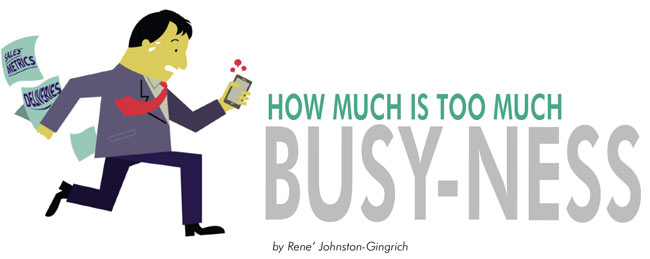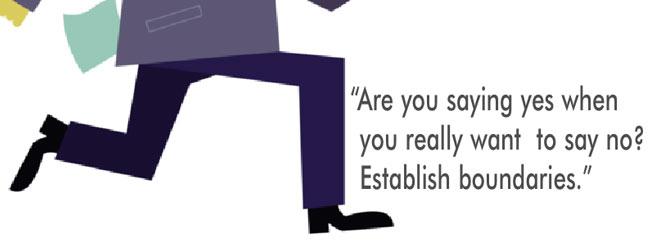
There are quite a few four-letter words that might offend. Perhaps one of the most surprisingly offensive and counterproductive four-letter words is BUSY.
When you find yourself relating to any of these scenarios, you may need to look at what “busy” really means to you and your retail organization.
- Do you find yourself constantly on the run?
- Does it feel like you’re putting out fire after fire with no time to catch your breath?
- Are you Running around a thousand miles an hour, stressing everyone else out (including yourself)?
- Do you find yourself choosing to do things yourself because you believe it to be quicker?
- Are you repeatedly on the verge of being late (or actually late) to meetings and appointments?
Do you find yourself having conversations that sound like this? “How are you?” “Busy.” “Did you see the latest, movie, book, art gallery?”, “Oh I have been meaning to but I’m just so busy”.
If you’ve nodded your head in agreement to any of these scenarios, it’s possible that you are one of the many furniture retailers, managers or sales professionals, that are so locked into a pattern of stress and chaos that you can’t see your way out.
The pace in a furniture store can be hectic but this issue is not exclusive to the furniture industry. Help is on the way and knowledge is power. Recently, there has been a tremendous amount of research and discussion on just how to change some of these unhealthy habits and behaviors. You can learn to work in a way that is busy and efficient. That’s because when you are just BUSY, you’re likely the one keeping yourself and your business stuck (think sales goals).
Busy Is Not The Same As Productive
Busy can be good if the busyness is increasing business. It is critically important that your store is busy. In order to sustain and exceed sales goals you must have customers coming through your doors. This means a lot of activity, and most importantly a lot of sales resulting from this activity. In regard to the operations of stores, busy is great, busy or even uber-busy is the goal we are hoping to achieve.
As an individual, though, busyness can impact business and not necessarily in a good way. This is when “busy” can become a four-letter word. How busy are you?
- Are you busy or productive?
- Do the tasks you consistently stay busy with generate results (increases sales and profit)?
Whether you are an owner, manager, or sales professional, these questions apply. For years in the American business culture it has been pounded into our heads that our success is measured by the length of the hours we work, how little sleep we get, how much we are trying to balance at one time and how irreplaceable we are to the organization. It might be time to throw out that tired measuring stick in favor of a more progressive approach.
Recently much research has been conducted and new patterns of thought have emerged that make a strong case for looking differently at how we perceive work. Let’s begin by looking at some of the notable findings.

What Others Have to Say
In her recent book “Thrive: The Third Metric to Redefining Success and Creating a Life of Well-Being, Wisdom, and Wonder”, Arianna Huffington describes some of her revelations after collapsing and suffering an injury as a result of sheer exhaustion. The cofounder and editor-in-chief of the Huffington Post Media Group makes a compelling case for the need to redefine what it means to be successful in today's world.
In “Thrive” Huffington explores how our relentless pursuit of the two traditional metrics of success -- money and power -- has led to an epidemic of burnout and stress-related illnesses, as well as deteriorating the quality of our relationships, family life, and even our careers. She suggests that in being connected to the world 24/7, we're losing our connection to what really matters.
In her book, Huffington references the pioneering research and scientific findings in the fields of psychology, sports, sleep, and physiology that show how strategies such as meditation, mindfulness, unplugging, and giving can lead us to embrace a new way of operating. This new line of thinking and operating calls into question our culture, our thinking, our workplace, and our lives.
If Arianna Huffington can run a media empire and maintain a level of sanity, can’t we?
Speaker, writer, and educator, Greg McKeown’s book, Essentialism: The Disciplined Pursuit of Less details the practice of getting more done in less time. It’s about getting only the right things done. He is adamant that this is not a time management strategy, or a productivity technique. It is a system for discerning what is absolutely essential, then eliminating everything that is not, so we can make the highest possible contribution towards the things that really matter.
He suggests we apply much more selective criteria for what is Essential; that the disciplined pursuit of less empowers us to reclaim control of our own choices about where to spend our valued time and energy. McKeown describes this strategy as a new way of doing everything. Essentialism is about doing less, but doing it better, in all areas of our lives.
Why Busy Is Such A Bad Idea
The idea is that in making these behavior adjustments we are working toward becoming our best selves. The concept, however, is not one born out of pure selfishness. Often we don’t realize the negative effects our “busyness” is having on others and our organization. Consider some of the negative side effects listed below.
“Busy” people put unnecessary stress on the people around them. Tension and anxieties are contagious. Be particularly careful if you are in a leadership position. An organizational culture needs to be built from the top down. Good employees seek to model the values and behaviors demonstrated by their leaders. Managers and sales staff take important cues from your behaviors.
“Busy” people frequently dismiss other’s ability to contribute. They have the “I’ll just do it myself” mindset. This causes others to feel undervalued and untrustworthy. This also happens when we discount other people’s suggestions for change or improvement. Delegate appropriate tasks to management and encourage the sales team to share responsibilities.
But “Busy” is who I am. Who would we be if not this super woman or super man who has it all under control (or is attempting to) and without whom the world (or store) would fall apart. The fact is that we are all replaceable. If you have truly structured your organization to depend on you to such an extreme degree—you have screwed up. An organization needs to stand on multiple legs. Unexpected things happen. Your life can change in a heartbeat and your store(s) needs to be structured to be able to withstand those types of blows.
What Can You Do
Are your systems less than efficient? Examine this objectively and work to make improvements. This may take some outside consulting or you may be able to track and monitor your efficiency and course correct. Invest in systems that track and quantify important metrics such as traffic counts, average sale, and closing ratios. For increased productivity be sure to provide your sales team with good Customer Relationship Management tools and hold them accountable for utilizing those tools. Hint: if you have a hard time asking for help, this might be where you need the most support.
Are you constantly subjected to distractions and interruptions? Identify them and eliminate where possible. Is your sales staff constantly coming to you with questions when they should be equipped to find the answers on their own? This also means paying close attention to your use of electronics including email, social media, telephone and more.
Are you taking care of yourself? Be careful not to confuse scheduled “time out” and distractions. A walk around the block at lunchtime that refreshes you or taking a moment to read an article that stirs creative thought should be integrated into your day, not eliminated from it. The retail environment is often frenetic. Take care to run your store instead of letting it run you.
Are you saying yes when you really want to say no? Establish boundaries, build fences and hold firm. It is better to do fewer things well than several things adequately. It is not uncommon in furniture retail to see co-workers, managers and even owners in the habit of doing someone else’s work—or at least a sizeable portion of it. Teamwork is one thing, allowing yourself to be taken advantage of is quite another. Often saying “no” to one thing gives you the room to say “yes” to business building opportunities in such areas as marketing or professional development.
Are you afraid if you slow down you will have to deal with something you are avoiding? Maybe something in your personal life? This is a tough one. Be honest with yourself and challenge yourself to make healthy changes.
It is in great danger of being overused but the old airline analogy regarding the need to put on your own oxygen mask first is applicable here.
Busy Doesn't Have To Be A Four-Letter Word
We all work hard for different reasons. Many of us feel that in today’s cutthroat retail business environment, if we don’t work around the clock, we will be fired or go out of business. This is a legitimate fear and I in no way want to discount it. I do, however believe there is a better approach and it is worth examining our patterns to see if we have fallen into this “busy” trap.
As with much in life, it is about quality and not quantity. Focused, quality interactions typically achieve better results than scattered efforts. Whether you embrace Huffington’s or McKeown’s specific strategies or not, the point is to examine, consider and make necessary changes. Even an incremental improvement is an improvement and will begin building a healthier individual and organization.
In closing I’d like you to ask yourself if your busyness is helping or hurting your store and or your personal life.
Some Additional Resources
Getting Things Done: The Art of Stress-Free Productivity by David Allen - Audio Book
Think Better: An Innovator's Guide to Productive Thinking by Tim Hurson
How to Reduce Workplace Conflict and Stress: How Leaders and Their Employees Can Protect Their Sanity and Productivity from Tension and Turf Wars by Anna Maravelas
Productive Workplaces: Dignity, Meaning, and Community in the 21st Century by Marvin R. Weisbord